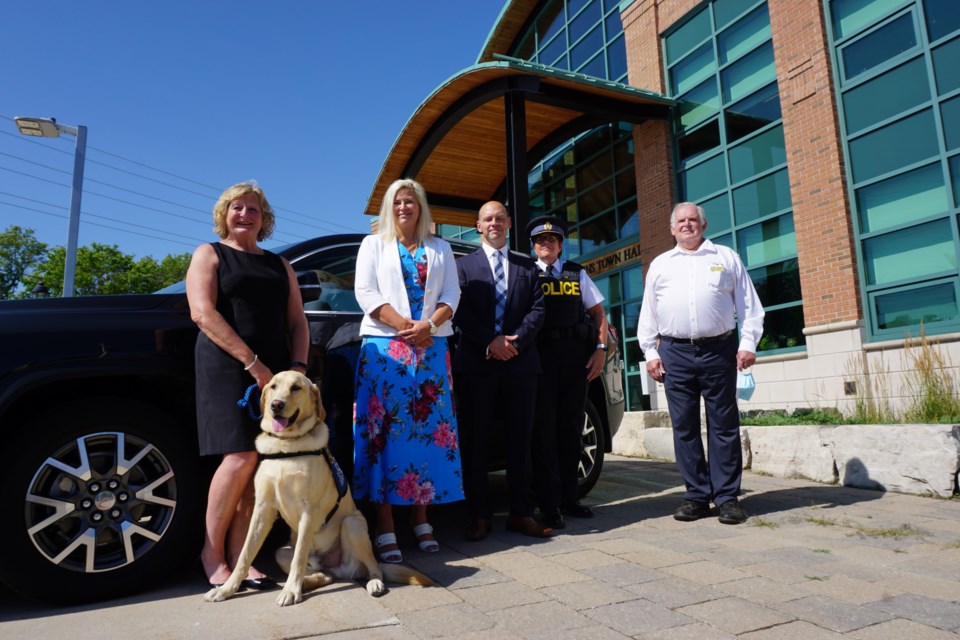A victim services initiative born out of the Blue Mountains/Collingwood Ontario Provincial Police (OPP) detachment is one year in and gaining international attention.
“We've generated a lot of interest and not just as an organization across the country, but literally across the world in terms of the approach that we've created here,” said Sgt. Terry Paddon, during a Blue Mountains police services board meeting held on June 16.
Last August, the Blue Mountains/Collingwood OPP detachment received grant funding to launch a first-of-its-kind victim services initiative that would see the creation of a mobile victim response unit.
The initiative allows members of the OPP to travel to the victim of a recent crime, as opposed to the victim having to travel to the region's bricks-and-mortar child advocacy centres in Barrie or Orilla.
According to Paddon, the added requirement to travel to these centres often increased and prolonged the associated trauma the victim experienced.
“Police services across the province, and realistically across the country, have recognized the need for us to do a much better job when it comes to victim services. We take what we now call a victim-centred approach,” said Paddon.
Through the initiative, a mobile victim service unit has been created, which consists of a vehicle, video equipment, a service dog and staff with specialized training in child advocacy.
When a crime against a child or involving a child witness is committed, police can call the unit, which will travel to the community where the victim resides, where a neutral location can be established for an interview.
This initiative was made possible by the proceeds of crime frontline policing grant, which is providing the detachment with $300,000 over three years for the program.
The mobile unit is available to OPP detachments across Simcoe and Muskoka counties.
According to Paddon, the first few months of the operation were spent organizing and training staff with the mobile unit being put into action in March.
“Since March 19, there have been 21 investigations that our mobile unit has attended on the West side of the OPP Central Region, two of which were in the detachment of Collingwood,” he said.
“So almost 50 per cent of the investigations have utilized our mobile unit that we created through our partnership, which is highly significant.”
Paddon added that the COVID-19 pandemic did create some obstacles in getting the initiative off the ground as it became more difficult to connect and create the community-based partnerships required to establish neutral meeting spaces in various communities.
Blue Mountains/Collingwood Detachment Commander Mary Shannon reiterated the initiative is gaining a lot of attention.
“There's a lot of requirements on these grants to provide reports back to the ministry on our results and our success. I don't think that these efforts go unnoticed. And, as Sgt. Paddon mentioned, this is gaining international attention,” Shannon said.
Paddon explained that he has had inquiries about the initiative from OPP detachments across the country.
“Certainly from the province of British Columbia there have been many inquiries in terms of the strategy that we've created here,” he said, adding that the York region, North Bay and several Indigenous Police Services have also made inquiries.
In addition, Paddon reported the OPP’s victim-centred approach team has also taken notice.
“They have in turn drafted the concept into an international grant extended as far as Scotland for the purposes of providing a much better approach to victim services, both in the abuse world as well as the human trafficking world and sexual abuse,” he said.
With one year under its belt, the program will continue to push forward with the grant funding for another two years.
“As we approach the end of the three years, we'll see where we're at in that regard. But my intent is not to end this initiative come the end of year three, but rather for it to be built upon,” Paddon said.
Shannon added that it would be unlikely that the initiative would come to an end in year three when the grant funding runs out as the program has already seen several benefits in its first year alone.
“As we near the end here, there could be permanent funding through the Ministry, if we demonstrate success, or another opportunity for us to apply for ongoing grant funding,” she added.
